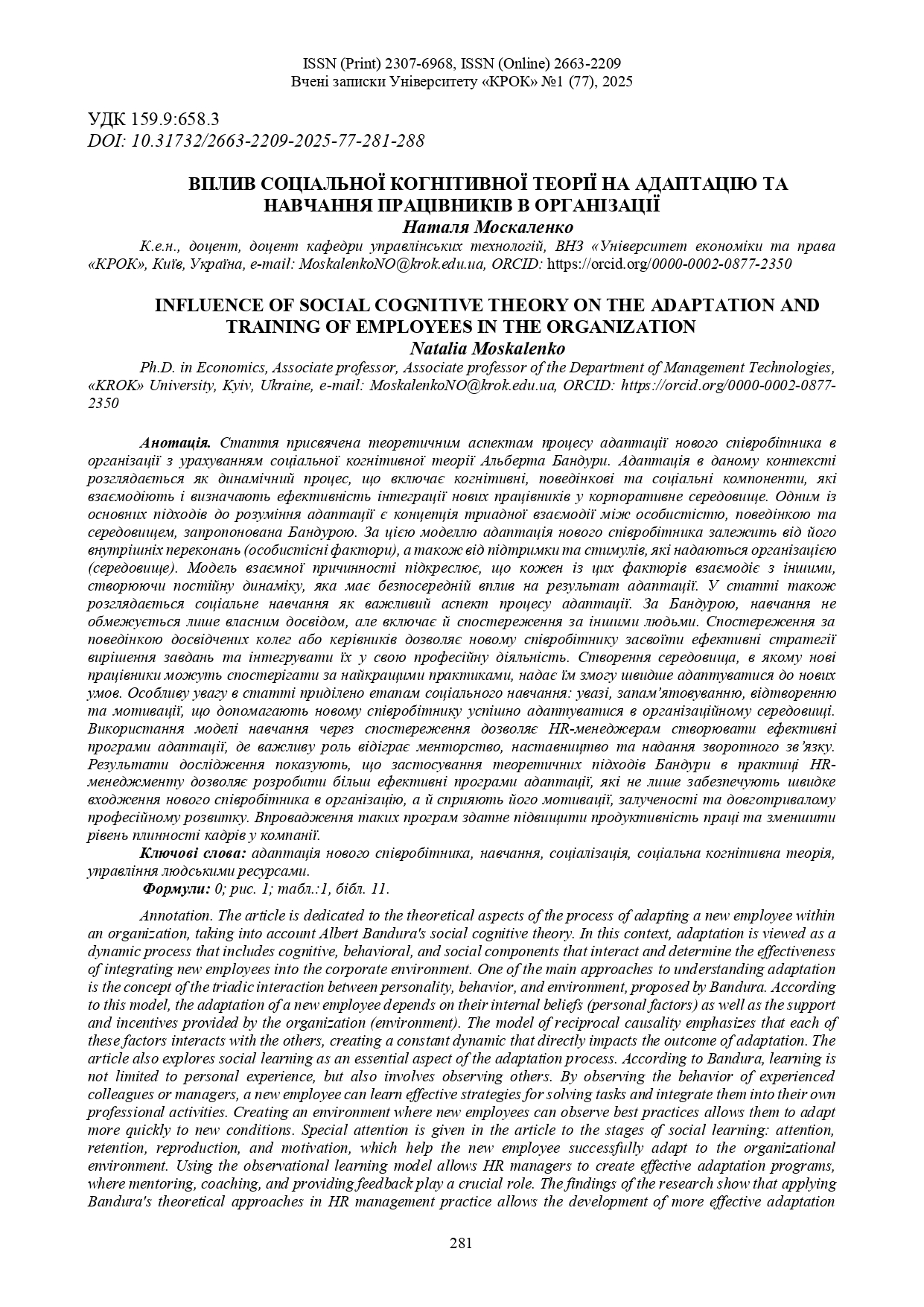ВПЛИВ СОЦІАЛЬНОЇ КОГНІТИВНОЇ ТЕОРІЇ НА АДАПТАЦІЮ ТА НАВЧАННЯ ПРАЦІВНИКІВ В ОРГАНІЗАЦІЇ
DOI:
https://doi.org/10.31732/2663-2209-2025-77-281-288Ключові слова:
адаптація нового співробітника, навчання, соціалізація, соціальна когнітивна теорія, управління людськими ресурсамиАнотація
Стаття присвячена теоретичним аспектам процесу адаптації нового співробітника в організації з урахуванням соціальної когнітивної теорії Альберта Бандури. Адаптація в даному контексті розглядається як динамічний процес, що включає когнітивні, поведінкові та соціальні компоненти, які взаємодіють і визначають ефективність інтеграції нових працівників у корпоративне середовище. Одним із основних підходів до розуміння адаптації є концепція триадної взаємодії між особистістю, поведінкою та середовищем, запропонована Бандурою. За цією моделлю адаптація нового співробітника залежить від його внутрішніх переконань (особистісні фактори), а також від підтримки та стимулів, які надаються організацією (середовище). Модель взаємної причинності підкреслює, що кожен із цих факторів взаємодіє з іншими, створюючи постійну динаміку, яка має безпосередній вплив на результат адаптації. У статті також розглядається соціальне навчання як важливий аспект процесу адаптації. За Бандурою, навчання не обмежується лише власним досвідом, але включає й спостереження за іншими людьми. Спостереження за поведінкою досвідчених колег або керівників дозволяє новому співробітнику засвоїти ефективні стратегії вирішення завдань та інтегрувати їх у свою професійну діяльність. Створення середовища, в якому нові працівники можуть спостерігати за найкращими практиками, надає їм змогу швидше адаптуватися до нових умов. Особливу увагу в статті приділено етапам соціального навчання: увазі, запам’ятовуванню, відтворенню та мотивації, що допомагають новому співробітнику успішно адаптуватися в організаційному середовищі. Використання моделі навчання через спостереження дозволяє HR-менеджерам створювати ефективні програми адаптації, де важливу роль відіграє менторство, наставництво та надання зворотного зв’язку. Результати дослідження показують, що застосування теоретичних підходів Бандури в практиці HR-менеджменту дозволяє розробити більш ефективні програми адаптації, які не лише забезпечують швидке входження нового співробітника в організацію, а й сприяють його мотивації, залученості та довготривалому професійному розвитку. Впровадження таких програм здатне підвищити продуктивність праці та зменшити рівень плинності кадрів у компанії.
Завантаження
Посилання
50+ Employee Onboarding Statistics You Must Know in 2024. (2024). Retrieved from https://www.g2.com/articles/onboarding-statistics?utm_source=chatgpt.com.
These 10+ Onboarding Statistics Reveal What New Employees Really Want in 2023. (2023). Retrieved from https://www.bamboohr.com/blog/onboarding-infographic.
Варис І. О., Кравчук О. І., Івахненко К. О. Світовий досвід у процесах адаптації персоналу: від теорії до практичного впровадження в Україні. Бізнес Інформ . 2024. №5. C. 357–366. https://doi.org/10.32983/2222-4459-2024-5-357-366.
Куделя В. І. Гриценко Н. В. (2020). Управління адаптацією персоналу сучасного підприємства. Вчені записки Таврійського національного університету імені В. І. Вернадського. Серія : Економіка і управління, Т. 31(70), № 4(1). 128-131. Retrieved from URL http://lib.kart.edu.ua/handle/123456789/14441.
Бойко А., Ситник Й. (2024). НАПРЯМИ ВДОСКОНАЛЕННЯ ПРОЦЕСУ АДАПТАЦІЇ ПЕРСОНАЛУ ІТ-ПІДПРИЄМСТВ. Економіка та суспільство, (63). DOI: https://doi.org/10.32782/2524-0072/2024-63-122.
Ситник Й., Пригарний С. (2024). Напрями розроблення інноваційних проєктів для адаптації персоналу будівельних підприємств. Економічний аналіз. Том 34. № 3. 80-89. DOI: https://doi.org/10.35774/econa2024.03.080.
Parsons, T. (1951). The social system. Free Press..
Williams, G. C. (1966). Adaptation and natural selection: A critique of some current evolutionary thought. Princeton University Press.
Bandura А. (2020). Social Cognitive Theory: An Agentic Perspective. Psychology the Journal of the Hellenic Psychological Society 12(3):313. Retrieved from URL: https://www.researchgate.net/publication/349206344_Social_Cognitive_Theory_An_Agentic_Perspective.
Офіційний сайт Альберта Бандури. Retrieved from: https://albertbandura.com/albert-bandura-social-cognitive-theory.html?utm_source=chatgpt.com.
Bandura, A. (1963). Social Learning and Personality Development. New York, Holt, Rinehart and Winston.

Downloads
Опубліковано
Як цитувати
Номер
Розділ
Ліцензія

Ця робота ліцензується відповідно до Creative Commons Attribution-NonCommercial 4.0 International License.

